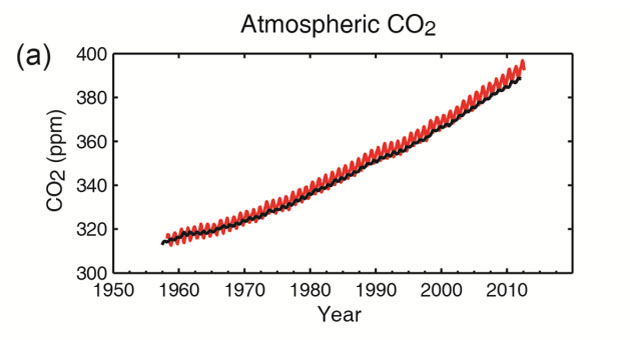
Atmospheric carbon dioxide is higher than it has been in nearly a million years, according to the data. Earth’s atmosphere has more carbon dioxide, more methane, and more nitrous oxide than it has had in “at least the last 800,000” years, according to the repot. A 40 percent increase in carbon dioxide has occurred since pre-industrial times, about the past 200 years: IGPC
By Glynn Wilson –
As if there was still any doubt in the scientific community, we now know that “human influence on the climate system is clear,” according to a new report just out from the United Nations Intergovernmental Panel on Climate Change.
“It is extremely likely that human influence has been the dominant cause of the observed (global) warming since the mid-20th century,” the working group of scientists conclude in their latest report. “Warming in the climate system is unequivocal and since 1950 many changes have been observed throughout the climate system that are unprecedented over decades to millennia. This is evident in most regions of the globe.”
They say the evidence for this has grown thanks to more and better observations, an improved understanding of the climate system response and improved climate models.
Each of the last three decades has been successively warmer at the Earth’s surface than any preceding decade since 1850.
“Observations of changes in the climate system are based on multiple lines of independent evidence,” according to the summary for policymakers of the IPCC Working Group I assessment report, Climate Change 2013: the Physical Science Basis, approved on Friday by member governments of the IPCC in Stockholm, Sweden.
“Our assessment of the science finds that the atmosphere and ocean have warmed, the amount of snow and ice has diminished, the global mean sea level has risen and the concentrations of greenhouse gases have increased,” said Qin Dahe, Co-Chair of IPCC Working Group I.
“Continued emissions of greenhouse gases will cause further warming and changes in all components of the climate system. Limiting climate change will require substantial and sustained reductions of greenhouse gas emissions,” said Thomas Stocker, the other co-chair of Working Group I. “Global surface temperature change for the end of the 21st century is projected to be likely to exceed 1.5°C relative to 1850 to 1900 in all but the lowest scenario considered, and likely to exceed 2°C for the two high scenarios.”
Heat waves are very likely to occur more frequently and last longer, he said. “As the Earth warms, we expect to see currently wet regions receiving more rainfall, and dry regions receiving less, although there will be exceptions.”
Projections of climate change are based on a new set of four scenarios of future greenhouse gas concentrations and aerosols, spanning a wide range of possible futures. The Working Group I report assessed global and regional-scale climate change for the early, mid-, and later 21st century.
The report finds with high confidence that ocean warming dominates the increase in energy stored in the climate system, accounting for more than 90 percent of the energy accumulated between 1971 and 2010.
“As the ocean warms, and glaciers and ice sheets reduce, global mean sea level will continue to rise,” Qin Dahe said, “at a faster rate than we have experienced over the past 40 years.”
Now we can we stop arguing and start doing something about it?













